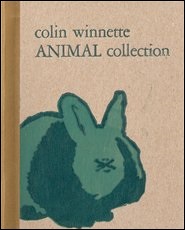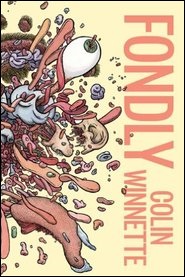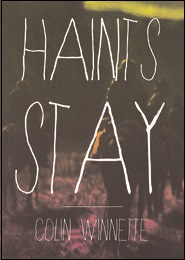about the author
Staff Book Reviewer Spencer Dew is the author of the novel Here Is How It Happens (Ampersand Books, 2013), the short story collection Songs of Insurgency (Vagabond Press, 2008), the chapbook Mont-Saint-Michel and Chartres (Another New Calligraphy, 2010), and the critical study Learning for Revolution: The Work of Kathy Acker (San Diego State University Press, 2011). His Web site is spencerdew.com.
To send your new book to decomP for possible review, see our guidelines. To find out what’s currently under consideration, visit our review queue.
∧
font size
∨




A Colin Winnette Omnibus Review of Animal Collection, Fondly, Coyote, and Haints Stay
Spencer Dew
A Review of Animal Collection (Spork Press, 2012)
Recently, spending a good deal of time with a toddler, I have reacquainted myself with the bestiary, as a form, and the abecedarium also. In the most popular system, one learns letters by repetition and through the association along the way with creatures, largely imagined. Few youths have seen a yak yet, after all, and the grinning cartoon alligator bears little resemblance to its bayou cousin. When I was a child, I did not know from the Quetzal or the X-ray fish, the second of which features here, in Winnette’s recently republished second book, an art object designed with reference to the board books of earliest youth. But if those books promised the simulation of reading sans the risk of papercut, Winnette’s is both wordy and sharp, like that X-ray tetra, gifted and cursed with verbal aptitude. “My words are like that of the making,” the fish declares, in the flash-chapter here devoted to his voice. But his gift of “putting the early life back into things” with words is used, only briefly, as a tour guide to what seem to be aquarium tanks, bringing visitors to the wall to stare at the captives: “Look at them suffer to live.”
Captivity reigns here, the supreme theme, in myriad forms, like the cacophony of animal voices. There’s the claustrophobic scene of a beaver calling, again and again, wanting your blessing on his new relationship with your ex, the emotions of which make getting crushed by an elephant or impaled with a pin seem cathartic by comparison. In another story, a crocodile makes out with the narrator’s girlfriend, open-mouthed. Another involves an octopus, backing up a sexual proposal with the suggestion of strength: “A tentacle twitched and was lifted brought over my head and placed at the back of my neck. It’s just a little less air than your body expects, he told me.” In this flood of stories, it becomes difficult to breath. The peacocks are drowned. Dead rabbits are pulled from hats and back pockets. The rare instances of liberation are disturbing in their own way, a surrender of the human in favor of a hopelessness, an embrace of the cage. Consider the lion, who appears in an act of transformation, like Teen Wolf, as his best friend notes. “I took shits wherever I wanted, drank water from the gutters when it rained. I ate trash when it looked good,” and eventually, he’s content enough to “just pad about in circles, thinking how little good it does to guess what happens next.” Even physical release can be cramped, confined: “Susan and I tried oral sex together one night when we were supposed to be watching a movie. It was a nice feeling, but it pissed me off. I don’t know why exactly. Trying to come was like trying to walk in one of those dreams where your legs are all heavy and stuck to the ground. I was just sitting there thinking about it, holding up her hair with both hands.” Tempted to taste a flower, in a story revolving around a hummingbird, a character finds that, on the tongue, the flavor is close to rubber, to suede.
Such crushing sense, this feeling of disappointment like a tent coming down around you, resonates more than a little with Raymond Carver, who makes an appearance here as well. The quail announces that she’s had an affair with him. “Did you fuck Raymond Carver in our bed, in our house, while our daughter was home?” asks her husband, “And she says yes to all of it.” Beasts, wildly unpredictable, yet still sometimes in the streetlights somewhat beautiful—that is what Winnette gives us, putting us in tiny cages from which to admire them.
A Review of Fondly (Atticus Books, 2013)
Two novellas. The first speaks of two sisters, a metamorphosis of story, or story after story, offering slants toward the same characters, shifting slices of kaleidoscope glass toward some vision of an idea. Here they are long-distance swimmers, subsisting on protein powder and chocolate; here they take a vow of silence and see a man “ratcheting” flesh between his legs, moving “his cupped hand along the shaft as if he were scattering birdseed”; here the sisters sprout wings, saw them off and cook them; and here they die. Violence is a constant, whether from a rifle or a tree that swallows—in a bark-covered Freudian nod—a man: “the tree’s trunk just zipped up like the back of a dress, and they could hear him gargling the dead wood from outside as they made their way back to the house.” The second novella, “Gainesville,” continues both the dreamy transition—in this case, generational, an inheritance of tweaking highs, rough luck—and the violence, from sloppy punishment of a son who shoplifted beef jerky sticks to a home invasion: “Two weeks later, there was another break-in. They put tape over Claire’s mouth and molested her in her bed. They held her down. They poured gasoline on her. They weren’t there to rob anyone. They lit a match.” Gainesville, the story of people shuffling through the place’s recent history, mixing pills, swallowing sand, putting on weight, letting their pets die, coming home to find their mother with a half-naked man “pushing her forward from behind.” The rage of Gainesville: to fling a road kill opossum, such a dull and unwieldy missile, such a perfectly apt analogy, like a “girlfriend with a dead tooth,” or taking someone else’s heart medication for a kind of buzz, with absinthe. There’s meth here too, obviously and of course, but you can’t always afford it, so you make do, which is also the story of Gainesville, quitting your job at Sonic once the baby comes, the mere existence of which is baffling if looked at in the right light. Or dream-like: “Your father and I had met many times before we met in this life,” says one character here, in the second novella, though the line stitches the two pieces together. “We were friends, lovers, teacher and student, we have known each other for many lives.” This is what Winnette wants to get at, this sense of many lives, story like those machines that spin, flipping past individual still images and making, in their motion, a horse, at full gallop, dash in flickering shadow, running across the far wall even as it stays impotently in place.
A Review of Coyote (Les Figues Press, 2015)
I’d done things as a kid that were hurtful, dangerous, just not knowing. I killed a few animals through sheer curiosity and aggressive ignorance. Drowned a hamster, suffocated a cat beneath a mattress. I never meant any harm.
So speaks the increasingly unreliable, increasingly menacing narrator of Coyote, a spare, gripping book of emotional intensity and violence both seen and—far more powerfully—implied.
The speaker above is a mother, describing her daughter, a child that has gone missing. The parents repeat the story of her disappearance, “to the police, to the reporters, to the prep-interviewers and interviewers and celebrity guests” entering into a cycle both of replacing memories with speech, with retellings, and of transforming from baffled and grieving (yet still hopeful) parents into something more like celebrities themselves, if only for a passing moment. Of the many addictions alluded to in this book, fame is one.
The infliction of violence, and the play of power are others: the father kills a coyote with a shovel, butchers a wild boar, drives nails through his own hands as a kind of therapy, maintenance and release. The mother sees sex as an act of force subverted, stolen: having sex with her husband, she imagines their bodies looking like “those alien babies in the movie Aliens” and thinks about his orgasm as the act of her “taking something from him. . . . Absorbing his energy or something.” These are people who become increasingly unlikable, seem increasingly not nice.
As does, honestly, their daughter. At first the refrain is one of pleading: “Give us our baby back. Bring her home, please.” Sleepless, the mother asks herself the same question the television hosts and police detectives ask: “What was our daughter like?” And she answers herself in ways both hagiographic and foreboding: “She was without visible flaws,” we hear, and “She worried about the characters in books from the very first page.” This veneer, too, gets peeled back, strip by strip. Soon we learn about the way the girl hurt animals, we see how she “She pet the cat against its fur, in spite of the fact that I told her many times that it was the wrong way” and hear how “She always left food on her plate because she claimed to like the feeling of scraping it into the trashcan with her fork.” Winnette’s skill at setting tone, at generating terror, manifests in that sound, which haunts the text. By the time that we hear the girl described as “the bossiest little brat on the block,” we, as readers, are already trapped in the house with the mother and the father, the hammer, the nails, the knives. Winnette is an expert at tension, at its escalation. This is a book to be read in one sitting, increasingly unsettled, the text clutched tighter and tighter until the final, frightening page.
A Review of Haints Stay (Two Dollar Radio, 2015)
How to build an American myth: light out for the territories. Soundtrack: carrion birds. The smell of blood and entrails. Tell the story like you’d tell a fortune, each detail ominous, each action portending retribution.
Flip over the next card: The orphan, the child, abandoned, who comes to replace his own father figure. A boy without any trail or history, discovered by two brothers, “mean and capable,” the gunslingers whose actions set him on this blood course. These brothers, Brooke and Sugar, are killers of a mode familiar from the genre, though unlike their forbearers from Zane Gray or John Houston in notable ways.
These fighters have bodies, in full, with “finer parts,” and a range of needs beyond hunger and thirst. Brooke, for instance, “did not require much in this life, but what he did require felt to him like pure necessity,” as when, on the run in the desert, he is overwhelmed with the urge for sex: “He would have fucked a hole in the sand if it would have stayed a hole long enough.”
Of Sugar and sex we hear nothing, but at one point, notably, he finds himself pregnant and must give birth. Asking the alcoholic town doctor (“He had steady hands until around 3 o’clock”) how he will birth the child, Sugar is told “Through your vagina.”
While the doctor considers Sugar to be “an abomination,” his ontology is presented as the opposite, natural, like breastfeeding, “not something he knew how to do, but something that had simply happened to him. It was a familiar enough idea, and when it came time to perform the task himself, something in him settled the child and his own body into place and the baby took hold.”
But nature, in these pages, is characterized foremost by death. Even the child, when it emerges from the womb, “covered in blood and something slick, thicker than blood, that held only a vague tint of pink and orange,” is initiated into the practices of violence, the doctor taking a knife to the “purplish-white rope running from the baby to the man” who birthed it.
To these two brothers, in particular, death—and dealing it—is the norm. When we first meet them, they have “just finished a job” and, “emptied of bullets and powder,” are anticipating that shift of their bodies from tense to calm, from violence to relaxation. Brooke’s desires play out like a scene from a movie: the comfort of “a noisy room,” a bar with “some kind of plunky music playing.” But even when they are lying in bathtubs smoking, these men are dangerous, and Winnette, particularly masterful at terse, compacted phrases implying larger narratives and scenes, puts his skill to sharp use, tracking the path of bodies left in the brothers’ wake, like the “bartender they had drowned in a horse bucket just beyond the church steps,” a phrase that lingers on the screen of the mind like a scene from that other Western myth, which Haints Stay frequently brings to mind, El Topo.
For ultimately the story Winnette spins feels timeless, outside of time, like the images in a tarot deck. The drowned man, the dead horse, brothers, the orphan. “There was no logic to life and no road that could take you straight to elsewhere,” one of the brothers observes. “Living was all winding around and doubling back.” Repetition, or eternal return.
In this book people consider rough men to be “boys without a father,” but part of the novel’s elegant design is exploring the way “plenty of fathers” have a hand in shaping destiny. Bristling with threat, this hostile landscape is overwhelmingly male, but with “men” existing in such multivalent and ambiguous identities and relations that they play all the roles, nurturing and cutting down, birthing and burying. And sometimes both.
How to build an American myth: “That’s why I’m here,” a character informs us toward the end, which is itself a commencement: “I would like to become a marshal, or a bounty hunter. I would like to head out and meet evil head on.” One does not head out on such a mission without being transformed by it. The wheel turns with a rusty screech, the cry of a vulture circling in the cruel desert sky.
Official Colin Winnette Web Site
Official Spork Press Web Site
Official Atticus Books Web Site
Official Les Figues Press Web Site
Official Two Dollar Radio Web Site